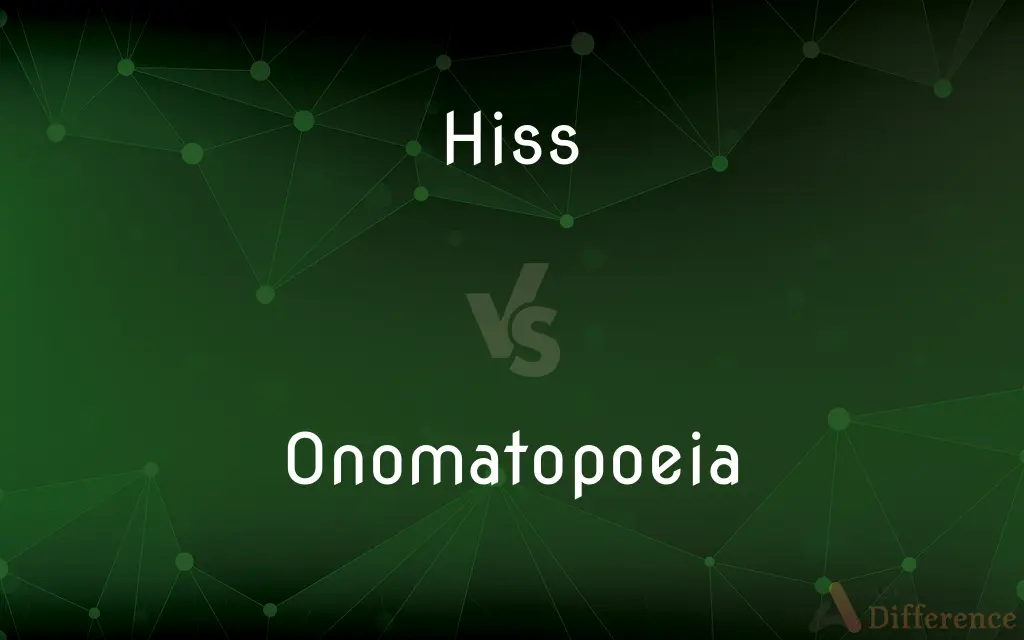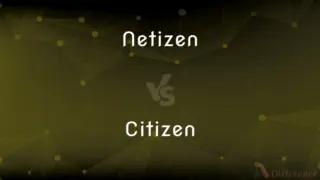Hiss vs. Onomatopoeia — What's the Difference?

Difference Between Hiss and Onomatopoeia
ADVERTISEMENT
Compare with Definitions
Hiss
A sharp sibilant sound similar to a sustained s.
Onomatopoeia
Onomatopoeia (also onomatopeia in American English), is the process of creating a word that phonetically imitates, resembles, or suggests the sound that it describes. Such a word itself is also called an onomatopoeia.
Hiss
An expression of disapproval, contempt, or dissatisfaction conveyed by use of this sound.
Onomatopoeia
The formation or use of words such as buzz or murmur that imitate the sounds associated with the objects or actions they refer to.
Hiss
To make a hiss
The audience booed and hissed. The teakettle hissed on the stove.
ADVERTISEMENT
Onomatopoeia
(uncountable) The property of a word of sounding like what it represents.
Hiss
To utter with a hiss.
Onomatopoeia
(countable) A word that sounds like what it represents, such as "gurgle," "stutter," or "hiss".
Hiss
To express (a negative view or reaction) by uttering a hiss
The audience hissed its displeasure.
Onomatopoeia
(countable) A word that appropriates a sound for another sensation or a perceived nature, such as "thud", "beep", or "meow"; an ideophone, phenomime.
Hiss
A sibilant sound, such as that made by a snake or escaping steam; an unvoiced fricative.
Onomatopoeia
The use of language whose sound imitates that which it names.
Hiss
An expression of disapproval made using such a sound.
Onomatopoeia
The formation of words in imitation of sounds; a figure of speech in which the sound of a word is imitative of the sound of the thing which the word represents; as, the buzz of bees; the hiss of a goose; the crackle of fire.
Hiss
(intransitive) To make a hissing sound.
As I started to poke it, the snake hissed at me.
Onomatopoeia
Using words that imitate the sound they denote
Hiss
(transitive) To call someone by hissing.
Hiss
To condemn or express contempt (for someone or something) by hissing.
The crowd booed and hissed her off the stage.
Hiss
(transitive) To utter (something) with a hissing sound.
Hiss
(intransitive) To move with a hissing sound.
The arrow hissed through the air.
Hiss
(transitive) To emit or eject (something) with a hissing sound.
Hiss
(transitive) To whisper, especially angrily or urgently.
Hiss
To make with the mouth a prolonged sound like that of the letter s, by driving the breath between the tongue and the teeth; to make with the mouth a sound like that made by a goose or a snake when angered; esp., to make such a sound as an expression of hatred, passion, or disapproval.
The merchants among the people shall hiss at thee.
Hiss
To make a similar noise by any means; to pass with a sibilant sound; as, the arrow hissed as it flew.
Shod with steel,We hissed along the polished ice.
Hiss
To condemn or express contempt for by hissing.
If the tag-rag people did not clap him and hiss him, according as he pleased and displeased them.
Malcolm. What is the newest grief?Ros. That of an hour's age doth hiss the speaker.
Hiss
To utter with a hissing sound.
The long-necked geese of the world that are ever hissing dispraise.
Hiss
A prolonged sound like that letter s, made by forcing out the breath between the tongue and teeth, esp. as a token of disapprobation or contempt.
"Hiss" implies audible friction of breath consonants.
A dismal, universal hiss, the soundOf public scorn.
Hiss
Any sound resembling that above described
But hiss for hiss returned with forked tongue.
Hiss
The note of a goose when irritated.
Hiss
A fricative sound (especially as an expression of disapproval);
The performers could not be heard over the hissing of the audience
Hiss
A cry or noise made to express displeasure or contempt
Hiss
Make a sharp hissing sound, as if to show disapproval
Hiss
Move with a whooshing sound
Hiss
Express or utter with a hiss
Hiss
Show displeasure, as after a performance or speech
Share Your Discovery

Previous Comparison
Pole vs. Pool
Next Comparison
Netizen vs. Citizen














































